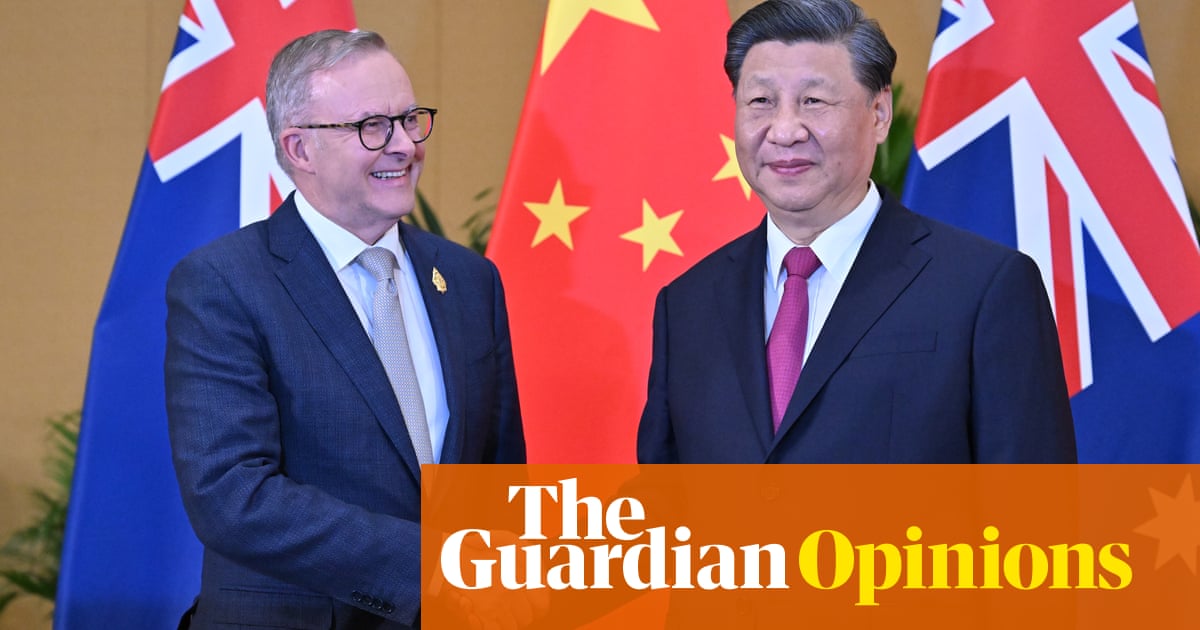
Anthony Albanese’s trip to China – the first by an Australian prime minister since Malcolm Turnbull’s in 2016 – has become a symbol of his effort to stabilise Australia’s relationship with China. In the lead-up to the trip, we saw progress on many of the frictions left over from the Morrison years.
Such a quick turnaround in bilateral relations is a credit to the Albanese government. But can this stabilisation endure and overcome many challenges to come?
One of the biggest long-term risks to a stable bilateral relationship are the expanding issues seen through a national security lens in both Australia and China. This has been and will continue to be detrimental to trade and people-to-people links.
Under Xi Jinping, national security has overtaken economic growth as the top priority. It is now “the bedrock of national rejuvenation”, according to him. As a result, the Chinese government is re-emphasising self-reliance in food and technology. It is also increasingly scrutinising individuals and businesses with possible foreign links, as part of its effort to stamp out espionage and influences of “hostile foreign forces”. Many companies and grassroots organisations became victims of this, from consulting companies to LGBT advocacy groups.
Australia is unlikely to convince the Chinese leadership to place less importance on national security or to tone down anti-espionage efforts. Of course, the Chinese government may moderate its approach to national security due to domestic considerations. For example, if economic growth slows down significantly as a result and causes widespread social discontent.
But the Australian government can control the securitisation trend in Australia. In the past five years, the country has undergone a similar process whereby any matter with a connection to China has assumed an acute national security dimension.
Where Beijing is concerned about reliance on foreign technology in supply chains and strives for self-reliance, Canberra is also concerned about technology manufactured in China and called for friendshoring. Where Beijing has expanded its definition of espionage to include foreigners insisting on meeting with people suspected of endangering national security, Canberra has also deemed giving open-source material to possible foreign agents as foreign interference.
Individuals with close connections to both Australia and China, such as Chinese Australians with families in China and Australian businesspeople in China, have borne the brunt of this securitisation trends in both countries. After all, they are the ones being harassed, either by nationalists and self-appointed national security vigilantes or by government officials, simply because of the deteriorating relations. This makes them less willing to continue to be the bridge between the two countries. Being forced to choose, some have decided to pick one or the other: Australian businesspeople leaving China or Chinese Australian academics leaving Australia.
And for those who still maintain connections to both countries, whether by choice or otherwise, they are much more cautious than before, including by downplaying their connections or interests. Many have continued to self-censor – a habit hard to break – despite the warming relationship over the last year. Without their voices, misunderstanding and distrust will become more frequent and severe.
Such people-to-people links, just like trust, can take a long time to repair and rebuild once broken. This is why having institutions that can endure beyond a term of the government or a budget cycle is important.
The Australian government and private companies in Australia should support the establishment of an institutionalised private diplomatic initiative similar to one we have with the US, the Australian American Leadership Dialogue. If we can have a private diplomatic initiative with one great power, there is no reason why we cannot have one with the other as well.
after newsletter promotion
In addition, the Australian government should also fund a centre to conduct independent and nonpartisan policy-focused research to increase understanding of China and to strengthen the bilateral relationship. This would be similar to the United States Studies Centre, which seeks to strengthen the Australia-US relationship.
Having independent institutions such as these would ensure that the stabilisation effort is enduring. Unlike a grant funding process, they would be less affected by the budget cycle or the political processes associated with ministers approving or denying a grant. These institutions can also provide independent advice to government, add to the diversity of policy debate on China, as well as help fostering trust between the two countries.
Rebuilding bilateral trust is a worthwhile endeavour. It allows both countries to think more clearly about the national interest of each decision rather than reacting emotionally. When something goes wrong, political leaders around the world can hold grudges or injured pride rather than making decisions in the best interests of their country. Having mutual trust helps mitigate that risk. The meeting between Albanese and Xi is the first step towards building it.

